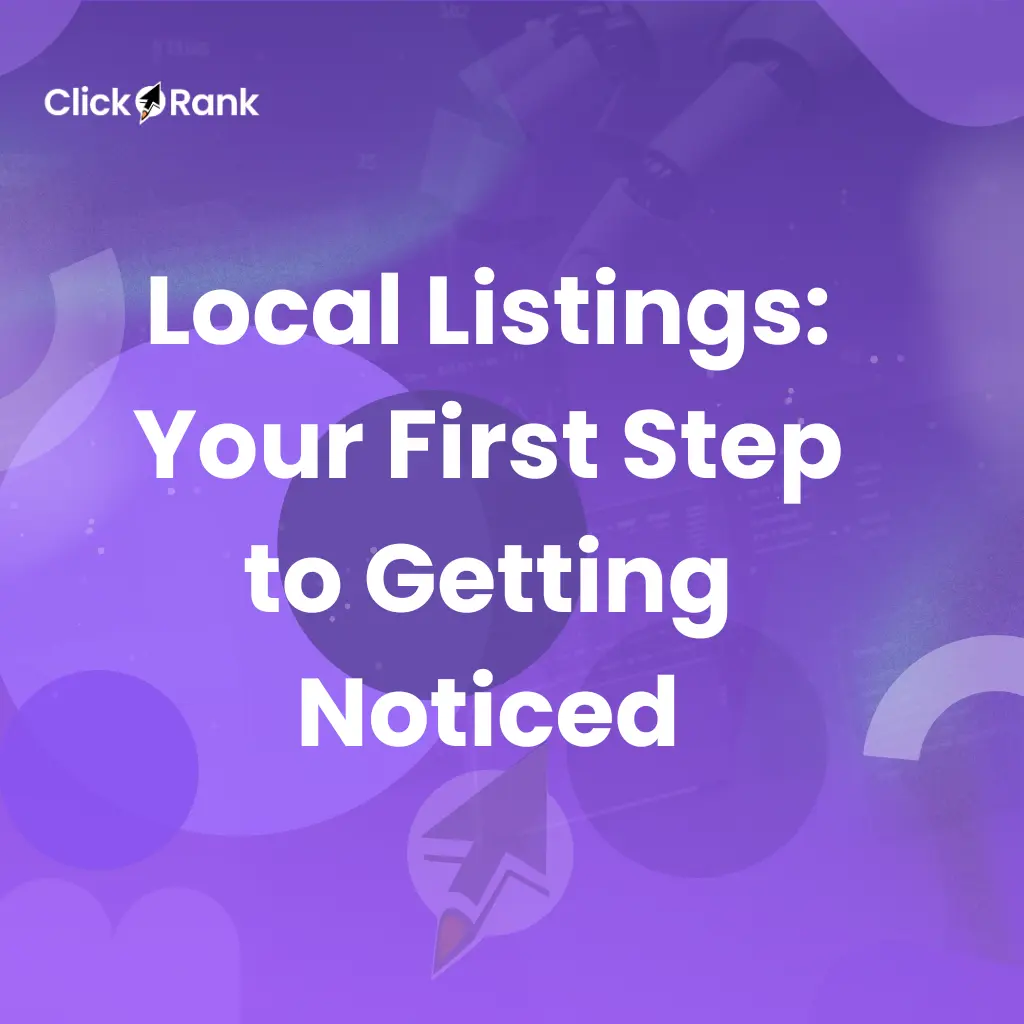SEO for Bakeries: Get More Local Orders
Running a bakery is hard work. You bake delicious goods and make people happy. But what if not enough people know about your business? This is where a good online presence can help. We'll show you how to improve your bakery's search results and get more local clients.
Make It Easy for People to Find You
Getting found online is the first and most important step. We want people to see your bakery when they search for things like “bakery near me” or “custom cakes in [your city].” We do this by setting up a Google Business Profile. This is a free tool that helps your bakery appear on Google Maps and in local search results.
Google Business Profile
Use a Google Business Profile to list your business. Make sure your name, address, and phone number are correct. Add your hours, website, and a short description of your bakery.
Online Directories
List your business on other sites like Yelp and TripAdvisor. These sites also help people find local businesses. More listings mean more chances for people to find you.
Local Keywords
Think about what people search for. Use local keywords like “bakery in Brooklyn” or “wedding cakes in Chicago” in your descriptions. This helps your business show up for local searches.
By making your information consistent everywhere, we help Google understand that your bakery is real and reliable. This makes it more likely to show your business to local customers.
Your Bakery's Digital Storefront
Your website is the heart of your online presence. It’s where customers can see your menu, your photos, and learn more about you. We will make your website work better for both your customers and for search engines like Google.
Easy-to-Use Website
Your website needs to be simple and easy to navigate. Customers should be able to find your menu, hours, and contact information quickly. Make sure it looks good on both computers and phones.
High-Quality Photos
Use great photos of your baked goods. People eat with their eyes first! Clear, professional pictures of your cakes, breads, and pastries will make customers want to visit.
Menu and Service Pages
Create separate pages for your menu items and services. For example, have a page for “Wedding Cakes” and another for “Birthday Cakes.” This helps people find what they are looking for and tells Google more about what you offer.
A great website is your best salesperson. It works 24/7 to attract new customers and show off your delicious creations.
Create Delicious Content
Content is the information on your website. This can be blog posts, recipes, or articles. Creating good content helps you become an expert in your field and gets you more online visibility. We want to attract people who love baking and food.
Start a Blog
Write blog posts about baking tips, new recipes, or stories about your bakery. For example, you could write a post like “5 Tips for Perfect Sourdough Bread” or “Our Secret Ingredient for the Best Chocolate Chip Cookies.”
Share Your Expertise
Show your knowledge. You can share behind-the-scenes stories, explain the process of making a custom cake, or talk about the ingredients you use. This builds trust and authority.
Use Keywords Naturally
As you write, use words that people might search for, like "gluten-free cupcakes," "vegan desserts," or "artisan bread." These terms help your content get found by the right people.
Good content makes your website more valuable. It brings in new visitors who might not have found your bakery otherwise, and it keeps existing customers engaged.
Get More Reviews
Reviews are very important for a local business. They build trust and help your bakery look popular and reliable. We will show you how to get more positive reviews from your happy customers.
Respond to All Reviews
Thank customers for positive reviews. If a review is negative, respond politely and offer to solve the problem. This shows you care about your customers and their feedback.
Use Review Sites
Focus on getting reviews on Google, Yelp, and Facebook. These are the most common places people look for feedback. High ratings on these sites will help attract new customers.
Reviews are like personal recommendations. They show that your bakery is good and trustworthy, which helps us get more local clients from Google.
Share on Social Media
Social media is a great way to show off your bakery's personality and connect with your local community. It helps you get more people to see your delicious products and your brand.
Show Off Your Products
Post great photos and videos of your new creations. Use Instagram and Facebook to showcase your daily specials, custom orders, and beautiful cakes.
Engage With Your Followers
Talk to people who comment on your posts. Answer their questions, thank them for their support, and share their photos of your baked goods. This builds a strong community around your bakery.
Post Regularly
Stay active and post new content often. This keeps your bakery in people’s minds and helps your social media accounts grow. Consistency is key to online marketing for contractors.
Social media is your bakery’s visual voice. It helps you connect with fans and turn them into loyal customers who come back again and again.
Use Backlinks
Backlinks are links from other websites to your website. Think of them as a vote of confidence. When other sites link to you, it tells Google that your bakery is important and trustworthy.
Collaborate With Local Businesses
Partner with other local businesses. For example, you could provide cakes for a local coffee shop or cater for a nearby event space. When they mention your bakery on their website, you get a backlink.
Local Bloggers and Journalists
Contact local food bloggers or journalists and invite them to your bakery. If they like your products, they might write a review and link to your website. This is a great way to improve your search results.
Sponsor Community Events
Sponsor a local school fundraiser or a community event. Your bakery might get a mention and a link on the event's website. This helps with digital visibility.
Backlinks are a powerful signal to Google. They show that your bakery is a valued part of the community, which helps us to get more local clients.
Analyze Your Progress
After all your hard work, we need to check how well everything is working. We use tools to see how many people visit your website and where they come from. This helps us make smart decisions to get more local clients.
Google Analytics
Use Google Analytics to see how many people visit your website. You can see which pages are most popular and how people found you. This is a free and powerful tool.
Google Search Console
Google Search Console helps you see what people are searching for when they find your website. It also shows you if there are any problems with your site. This helps you get more local clients from Google.
Track Your Reviews
Keep an eye on your reviews and ratings on Google, Yelp, and other sites. Look for trends and see if your efforts to get more reviews are working.
By regularly checking your progress, we can see what’s working and what we can do better. This helps us grow your bakery and get more customers in the door.
Why Your Bakery Needs a Strong Online Presence
In today's digital world, most customers look for local businesses online. They search for "bakeries near me" or "best custom cakes" on Google. If your bakery doesn't show up, you're missing out on new customers. Having a strong online presence helps you connect with these people and grow your business. We help bakeries like yours get noticed online, so you can focus on baking delicious treats.
More Local Customers
We help your bakery appear in local search results. This means more people in your area will find you when they're hungry for fresh bread or pastries.
Stand Out from the Crowd
Our process makes sure your bakery's website and social media look professional. We highlight what makes you special, whether it's your famous croissants or custom wedding cakes. This helps you stand out from other bakeries.
Effortless Online Marketing
We use the power of ClickRank to find easy ways to improve your website. Our AI-powered audits show you what to fix, and our one-click fixes make it simple. We handle the hard work of on-page optimization so you don't have to.
Grow Your Business
By improving your digital visibility, you get more website visits, more calls, and more in-store visits. This leads to more sales and a stronger business for you.
The Baker's Digital Guide: Improving Your Bakery's Online Presence

Local Listings: Your First Step to Getting Noticed
Having a great bakery is only half the battle; people need to find you. The first and most important step to getting more customers is to set up and complete your local business profiles. These online listings are like a digital address book for your bakery, making it easy for hungry people nearby to find your hours, phone number, and location.
-
Google Business Profile (GBP): Create a complete profile with your bakery's address, hours, photos of your best items, and a link to your website. This is the single most important thing you can do for local visibility.
-
Yelp and TripAdvisor: Claim your pages on these review sites. Respond to customer reviews to build trust and show you care about your patrons.
-
Directory Listings: Add your bakery to other local business directories like Bing Places for Business to increase your chances of being found.
By taking the time to set up and manage these profiles, you are laying the foundation for all your online marketing efforts. It’s a simple step that makes a big difference in helping new customers discover your delicious baked goods.
Sweeten Your Website: On-Page Optimization
Your website is your online storefront. To get more visitors, it needs to be easy for both customers and search engines to understand. This is where on-page optimization comes in. We use the tools from ClickRank to scan your site, looking for ways to make it better. Our platform gives you specific suggestions and even offers one-click fixes to make improvements fast and simple.
-
Titles and Descriptions: Write clear, tempting titles and meta descriptions for your pages that include your city and what you offer (e.g., "Artisan Bread in Boston" or "Best Cupcakes in Chicago").
-
Images: Compress photos of your cakes and pastries so your pages load quickly. Add descriptive alt text to images so search engines know what they are.
-
Content: Write unique descriptions for your products and services. Talk about the ingredients you use and the care you put into your baking.
A fast, clear, and organized website tells both visitors and search engines that you are a serious business. With ClickRank’s AI-powered SEO audits, we identify what needs fixing, helping you create a website that not only looks great but also performs well.


Attracting Customers with Content and Community
Content isn't just words on a page it's your chance to tell your bakery's story. Sharing valuable information and beautiful photos helps you connect with your audience. Think about the questions your customers ask you every day. Answering these questions on your blog or social media can bring new people to your business.
-
Blog Posts: Write about topics like "The History of Sourdough" or "How to Store a Freshly Baked Cake." This shows you are an expert and gives people a reason to visit your site.
-
Recipe Sharing: Share a simple recipe for a popular item, like your best cookie. People love this, and it builds goodwill.
-
Behind-the-Scenes: Post photos or videos of your team baking. This creates a human connection and makes people feel like they know your bakery.
Creating helpful content is a powerful way to improve your digital presence and show your passion. When people see that you are more than just a business, they are more likely to become loyal customers who keep coming back for more.
Get More Reviews: Building Trust Online
Good reviews on sites like Google, Yelp, and Facebook tell new customers that your bakery is a place they can trust. We recommend a simple system to encourage happy customers to share their experiences.
-
Ask Directly: Put up a small sign at your counter asking customers to leave a review. A simple "Love our bread? Leave us a review on Google!" works wonders.
-
Follow Up: For online orders, include a short note in the box or a follow-up email asking for feedback and a review.
-
Respond to All Reviews: Thank people for positive feedback and politely address negative comments. This shows you are listening and value your customers.
Building a positive reputation online takes time, but it’s one of the best investments you can make. It tells potential customers that your bakery is not just good, but loved. With the right strategy and a bit of effort, your positive online reputation will become your best tool for getting new business.

What is SEO for bakeries?
SEO for bakeries is the process of improving your bakery’s website and online presence so it appears higher in search engine results. This helps more local customers find your business online. It includes things like updating your Google Business Profile, getting reviews, and making your website faster and easier to use. With a good strategy, you can get more visits to your store and more online orders.
How do I improve my bakery's visibility in local searches?
The best way to improve your local visibility is to start with your Google Business Profile. Make sure all your information is correct and that you've added photos and hours. Getting positive reviews from customers also helps a lot. We help you find simple fixes so that people nearby can discover your bakery easily.
How can online marketing for bakeries help my business grow?
Online marketing for bakeries helps you reach more people than traditional methods. When you optimize your site, you attract new customers who are actively searching for what you sell. This can lead to more foot traffic, more catering orders, and a stronger reputation in your community. It's a key way to grow your business in today's market.
What is the most important part of getting more bakery clients from Google?
The most important part is being seen as a reliable and relevant result. This means having a fast website, a complete online profile, and good reviews. Our ClickRank tool uses an AI-powered SEO audit to show you exactly what to fix. With our one-click fixes, you can quickly improve your site to attract more customers from Google.
Can a small bakery really compete with bigger chains online?
Yes, absolutely. Small bakeries can often do better in local search results. People often look for unique, local businesses. By focusing on improving search results for small baking businesses and highlighting what makes you special—like your unique recipes or friendly service. You can easily stand out and get more customers than larger chains.
How can I use reviews to improve my digital visibility for my bakery?
Reviews are a powerful tool for improving your digital visibility. When you get a lot of positive reviews, search engines see your bakery as popular and trustworthy, which can help you rank higher. They also help new customers feel confident in choosing your bakery. Always respond to reviews to show you care about your customers.
Ready to Get Found Online?
Your delicious baked goods deserve to be discovered by more people. We know you’re busy baking, so we made it simple. Let us take the guesswork out of improving search results for baking businesses.
With ClickRank’s easy-to-use tools, you can get a free audit to see what your website needs. Our on-page optimization solutions save you time and help you connect with more customers, so you can focus on what you love to do most.